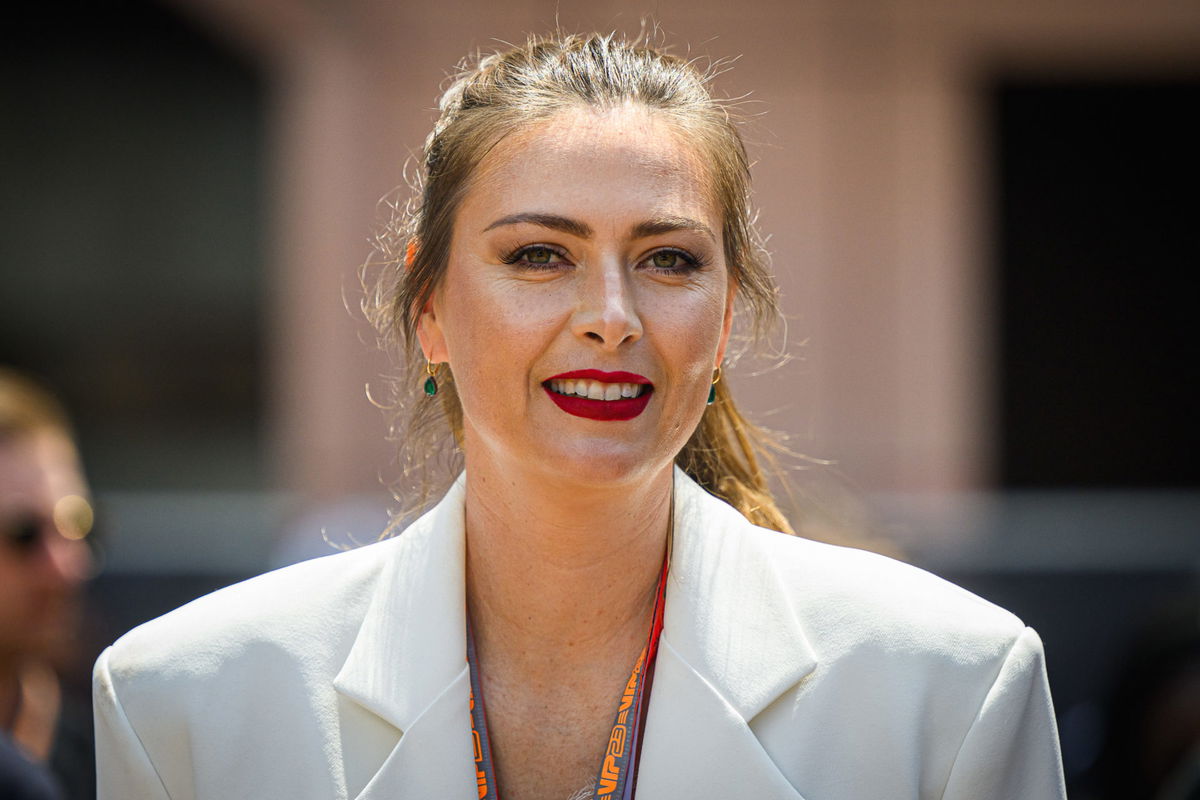
Getty
MONTE CARLO, MONACO – 2023/05/28: Maria Sharapova, former tennis player seen in the F1 paddock ahead of the Monaco F1 Grand Prix race. The 80th Monaco Formula 1 Grand Prix saw Red Bull’s Max Verstappen win ahead of the Aston Martin’s Fernando Alonso and Alpine’s Esteban Ocon. (Photo by Andreja Cencic/SOPA Images/LightRocket via Getty Images)

Getty
MONTE CARLO, MONACO – 2023/05/28: Maria Sharapova, former tennis player seen in the F1 paddock ahead of the Monaco F1 Grand Prix race. The 80th Monaco Formula 1 Grand Prix saw Red Bull’s Max Verstappen win ahead of the Aston Martin’s Fernando Alonso and Alpine’s Esteban Ocon. (Photo by Andreja Cencic/SOPA Images/LightRocket via Getty Images)
Maria Sharapova won her first major title at the 2004 Wimbledon when she overpowered two-time defending champion Serena Williams. While the victory brought her name to the spotlight, she was also chosen for the Global Marketing Campaign for Motorola, which offered “massive visibility” to her business career. Twenty years later, she pens down her thoughts about that turn of fate, highlighting how female athletes should carefully consider their endorsement deals.
Watch What’s Trending Now!
Sharapova’s selection for the Motorola campaign was based on two things: her “seamless mobility” and her “tech-savvy” attitude. Reflecting on the decision to sign the Russian, the brand’s senior vice president and chief brand officer said, “Our interest in Maria Sharapova wasn’t about having an athlete endorsing our product. We believe Maria connects with a new breed of consumers seeking global connectivity through stylishly engineered products that fit their lifestyles.” Although the deal wasn’t very lucrative in terms of price point, the WTA legend later explained how it became one of her career’s biggest turning points.
“Though the company offered less money upfront than other brands, my team recognised the value of a campaign that authentically showcased my character via the now-famous story of when I tried — unsuccessfully — to call my mom from the court after that first Grand Slam victory,” said the WTA legend. Sharapova referred to the iconic moment of winning the 2004 Wimbledon at 17 and rushing to the player’s box to hug her father afterward. However, her mother was flying to New York then and witnessed her daughter’s epic milestone on her plane journey. Sharapova, delighted and emotional at the same time, tried to call her mother and express her feelings but in vain. She told the camera how her phone kept switching off every time she tried to turn it on to call her mother. Motorola had their golden opportunity – they ran with it and how!
ADVERTISEMENT

Getty
BEVERLY HILLS, CA – MARCH 12: Maria Sharapova attends 2023 Vanity Fair Oscar After Party Arrivals at Wallis Annenberg Center for the Performing Arts on March 12, 2023 in Beverly Hills, California. (Photo by Robert Smith/Patrick McMullan via Getty Images)
Sharapova confessed that she was hesitant about the deal since she was looking forward to better financial opportunities. Coming from humble beginnings, money was always an important factor for the Russian former pro. However, soon enough she realized that “the right deal isn’t always the biggest one.” Last year in a podcast of Bloomberg Originals, she explained how this deal helped her massively, because she was associated with a company that might not have paid her much but featured her in many of their campaigns.
Sharapova said to host Jason Kelly, “I was on billboards from Tokyo to Seoul to Paris, and it opened up so many more doors than perhaps a deal that was worth a few million a year.” Ultimately, the pivotal Motorola deal as pivotal shaped her journey as a businesswoman in the future. Sharapova recalled when she retired she “had built a solid foundation” to start the next phase of her life as an investor and successful entrepreneur. But how did she do that? Let’s hear from the legend herself.
ADVERTISEMENT
Maria Sharapova’s Motorola deal built her business foundation for a post-tennis career
For Sharapova, the 2004 deal with the tech giant – a company now valued at $77 billion – was more than just exposure. It also provided valuable business lessons to the Russian star. Reflecting on her transition away from professional sports, she shared with Business of Fashion that retirement from professional sports is “notoriously difficult,” but having a business mindset helped ease her shift. “While nothing could ever truly replace or replicate the elite athlete experience, having a business background to lean into certainly helped,” the former WTA number one said.
ADVERTISEMENT
Sharapova drew parallels between business and sports, noting that both require persistence and resilience. “Business needs persistence like sports,” she explained. Both fields involve setbacks, criticism, and celebrating small victories toward larger goals – fundamental qualities that guided her growth as a businesswoman. Soon, she started investing in and advising several well-known companies, including Supergoop, Bala, Tonal, Therabody, Public.com, and Cofertility. She also joined the board of Moncler and, more recently, became the wellness ambassador for Aman Hotels.
Despite her successful ventures into fashion and entrepreneurship, Sharapova emphasized that women’s sports still needs more work and visibility. She believes brands must support female athletes’ voices, just as New Balance does for Coco Gauff and Nike for Naomi Osaka. According to the WTA legend, brands can help female athletes raise their voices and fight for their socioeconomic equality by empowering them with leadership roles.
Top Stories
Amateur Takes Million Dollar Home After Breaking Jannik Sinner’s Australian Open Streak

Ben Shelton Caught in ASB Classic Mayhem as Horrible Conditions Stop Play Yet Again

Casper Ruud Confirms He Might Leave Australian Open In Between Because of Family Emergency

Jessica Pegula and Madison Keys Call Out Serena Williams’ Ex-Coach Over “Disrespectful” Comments on Tennis Icon

Naomi Osaka Engages in Trash Talk With Amateur at Australian Open: “Just Get on the Court”

In a nutshell, Maria Sharapova’s words offer valuable insight into the journey of female athletes. For emerging female talents in the sport, she advises careful research before signing collaborations. While not all partnerships may offer immediate financial gain, they can lay the foundation for future success. Do you agree with this iconic tennis personality?
ADVERTISEMENT
ADVERTISEMENT
ADVERTISEMENT
ADVERTISEMENT

